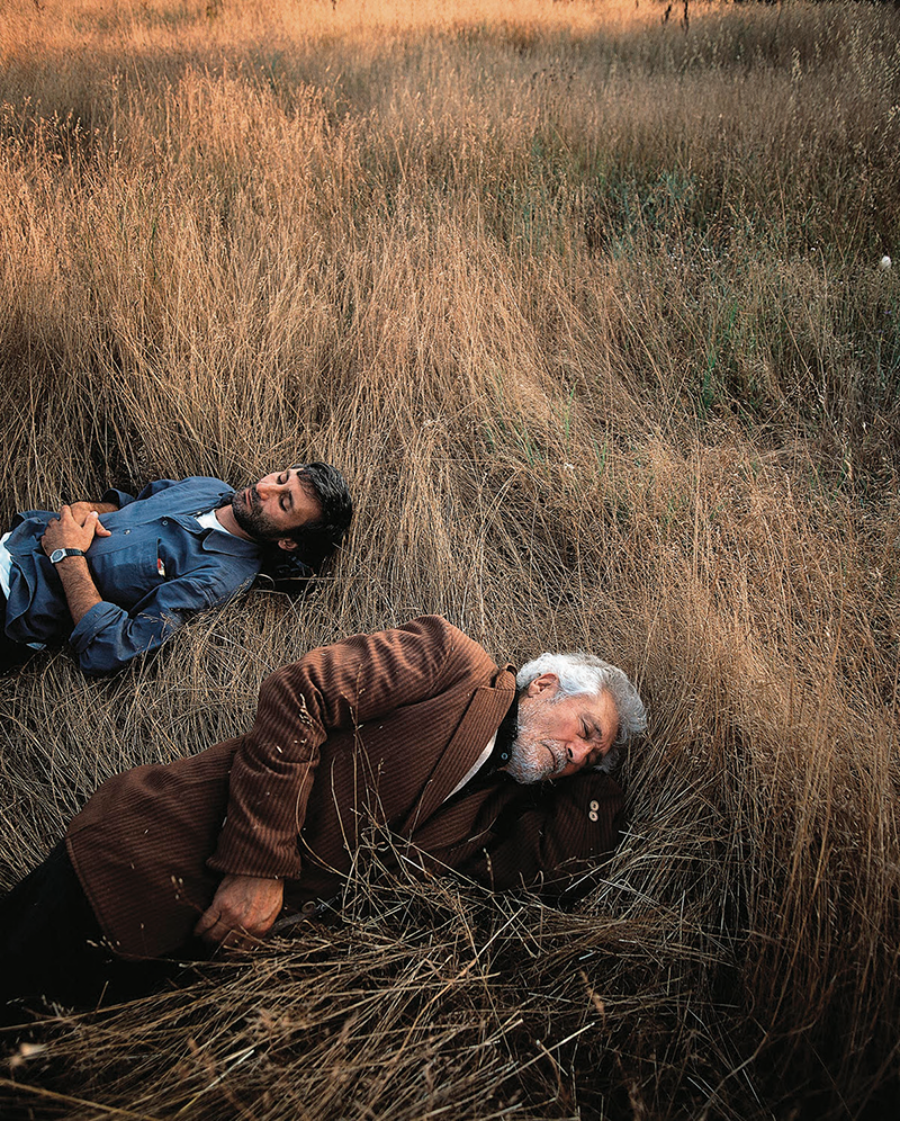
A photograph from the poster for Clouds of May. All images courtesy Nuri Bilge Ceylan/NBC Film
Discussed in this essay:
The films of Nuri Bilge Ceylan.
In Distant (2002), the Turkish director Nuri Bilge Ceylan’s tragicomic masterpiece, a small-town factory worker named Yusuf arrives in Istanbul with dreams of a sailor’s life. He moves in with his cousin Mahmut, a photographer. Most people in the city are originally from somewhere else, but Mahmut has tried hard to forget this. His tastes and habits are urban, his loneliness too. He wears soft turtlenecks and an expression at once sly and weary, like a spent wolf. Sophistication has curdled into cynicism. The shelves of his apartment are crammed with books and Bach, but all we ever see Mahmut do is stare at the TV, ignore his ailing mother’s calls, and have unhappy sex with a married woman. We first meet him eyeing her from across the room, then wiping down the bed: the stickiness of human entanglement is what he must keep at bay.
Into this fastidiously guarded solitude crashes Yusuf, with his naïveté and messiness and doughy face. But there are no jobs on the ships: the economic crisis that drove him to the city has struck here too. Besides, it is winter. Istanbul is ravishing and hostile, wrapped in snow. Trudging helplessly around the docks, Yusuf comes upon a massive hull keeled on its side, caught in the ice, an image that appears both unearthly and convincing, drawn from life—Ceylan’s signature. The pursuit of women yields no more success. But Yusuf is not the only one with foundered hopes. Mahmut has traded his artistic ideals for a gig photographing tiles, and his ex-wife is moving to Canada with another man. That his dopey country mouse of a cousin represents his best chance at companionship is the painful joke spun out until the end. With little more in common than their frustrations and inadequacies, that neither is able to bridge the gulf both sharpens and eases the ache.
The film is a study of ennui made riveting by Ceylan’s delicate camerawork—awake to both the city’s glowering beauty and the minor calibrations of a moody face—and that staple of farce, the yoking of opposites. There are moments of deadpan sublime. One night the odd couple stay up watching Stalker, Tarkovsky’s unhurried epic. It is hard to say who is enjoying it less: intense concentration and screaming boredom look much the same. Yusuf, unable to keep his eyes open, makes his excuses and retires. The moment he shuts the door, Mahmut switches to porn, his demeanor unchanged, only to scramble for the remote when Yusuf makes an unexpected return. He lands on a broad, blue-collar comedy which he is then forced to watch with Yusuf, happier now and wide awake, chortling behind him.
Distant won the Grand Prix at Cannes, and best actor for its two leads, and more awards than any other Turkish film before or since. (A bittersweet triumph: Mehmet Emin Toprak—who played Yusuf, and was Ceylan’s cousin—was killed in a car accident soon after filming finished.) Ceylan dedicated the Cannes prize to his compatriot Yılmaz Güney, who had received the Palme d’Or two decades earlier for Yol, a portrait completed in exile of oppression in the wake of the 1980 military coup, and who was never able to bring his award home. He died, as Ceylan said in his speech, “in Paris, suffering.”
All Ceylan’s films—one short, eight features—are set in Turkey (he has said he would not consider making them elsewhere) and are concerned with exile and entrapment of an internal kind. Distant might have served as a title for any of them. They explore what it is to be far from a sense of belonging, from other people, from one’s own past or horizon: a cinema of the neither nor. Characters seek and strive, are rarely satisfied. Eventually they stop seeking. Often, something is being quietly mourned: lost children, blighted hopes, the sheer capacity for fellow feeling. Like other Turkish filmmakers who emerged in the 1990s, Ceylan is interested in the tension between personal and social struggles, the discontents of contemporary life—what is lost in the movement from the country to the city, in Turkey’s rush to modernize, or simply in the passage of generations. But his oeuvre offers gifts to the eye and soul that place him in a lineage beyond borders: Ozu, Kiarostami, Bergman. The Stalker gag is all the more salty as Tarkovsky’s influence is strong.
There are no duds, no false starts. Three more Cannes trophies followed those for Distant, including the Palme d’Or. That Ceylan began making features in his late thirties only begins to explain it. The sense is of an artist who emerged fully formed and has produced, at the rate of one every two or three years, less a sequence of films than a cosmos, each work reflecting and responding to the others. Some have found fault with his pessimism, his perfectionism, the languorous pace of his films. For many others, it is precisely these slow-burning pleasures—the control of composition and light, the subtle treatment of human complication, the melancholy lyricism—that set him among the great filmmakers of our age.
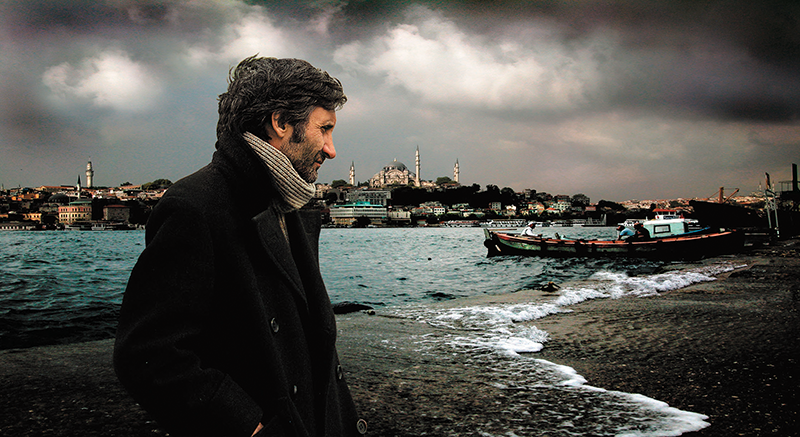
Muzaffer Özdemir in Distant
Born in Istanbul but raised in the North Aegean province of Çanakkale, where his father worked as an agricultural engineer, Ceylan in his early films is alive both to the tender raptures of rural life and to its tedium. By then childhood was far behind: after engineering studies, military service, spells abroad waiting tables in London and traveling in the Himalayas, taking pictures all the while, he returned to Istanbul to study cinematography but dropped out after two years and decided simply to start working. He bought an Arriflex camera and spent two years making the twenty-minute Cocoon (1995), a wistful, wordless meditation in black and white; juvenilia can sometimes look like late style. An elderly couple—played by Ceylan’s mother and father—separate, remember, sleep, reunite. Death watches. A restless child upsets a hive of bees. The wind moves through wheat like a god. No score but the busy, twittering world: birds, crickets, thunder. It is a photographer’s film, but what is being contemplated is not simply decoration; it is the characters’ own emotional weather. This is the beginning of a project Ceylan will develop patiently, without compromise, over twenty-five years: an art of noticing in service to the unformulable stirrings of the heart, its troubled atmosphere.
The Small Town (1997) continues his monochrome sketches of childhood and the natural world, and prefigures the lure of the city. We begin in a classroom. It is snowing outside; a woodstove dominates the room. The day’s lesson drones on, but the camera is more interested in what the pupils see: a feather they keep aloft by blowing it back and forth, a cat complaining at the window, or wet socks hung to dry above the stove, each drop hissing as it hits the hot metal. There is a sfumato quality to the young faces, as if painted with charcoal—dreamy and a little smudged, like the children’s attention.
We follow a brother and sister home across the fields. Here too, there is wheat in motion, and oak leaves glistening after the storm. Here too, a gentle regard for animals and those who make them suffer; an encounter with a donkey tips a sun hat to Bresson’s Balthazar. The children stop to eat plums in the dappled shade of a cemetery. Mixed with this pastoral mood are the first hints of something uncanny, a fantastic of the everyday, as when Toprak’s character, Saffet, is seen smoking at the fairground, an amusement ride at his back, the shrieking bodies awhirl around his head like mad angels. The film’s centerpiece is a long, ancestral scene: three generations sitting around a fire at night (Ceylan’s own relatives are put to work here too). The old father is telling war stories; his wife is shucking corn. They have lost a son, but it is God’s will. Their other son has gone to college, even lived in America, and returned to settle here. He knows about Darwinism and how to say “cradle of civilization” in three languages. But what good is all this knowledge if you don’t share it with anyone? That’s Saffet, his nephew, who finds comfort neither in the family’s traditional rhythms nor in his uncle’s dry theories. The small town is a prison. Our last sight of him is from behind, as he walks down the country road toward his future. As with Chekhov, his great teacher, there is something of Ceylan in each of his characters: he can never come to judgment before it softens into understanding. He is at once the jaded elder, the young buck heading for disappointment, and the child dreaming by the fire.
While watching footage from the making of this film, Ceylan has said, he was struck by his own harshness in directing his family. This insight prompted Clouds of May (1999), about a cineaste who returns to his hometown to shoot a film. Where The Small Town showed off a sensitive, singular eye at work, the follow-up is a funny, unflattering portrait of the auteur as a self-absorbed tyrant. (Kiarostami had made a similar move with Through the Olive Trees, a behind-the-scenes sequel to And Life Goes On.) Muzaffer Özdemir, who would later portray the photographer in Distant, here plays another of Ceylan’s degraded alter egos. While the father lugs wood, Özdemir sits in a deck chair ardently filming an oak leaf, and when at length he rouses himself and offers to help chop, he doesn’t know how to handle the axe. What was once home has become location, mined for scenic potential. What were relatives and neighbors are now forced to perform; the prodigal son has little time for their actual lives and struggles. He is neither native nor outsider, but estranged.
Ceylan’s send-up of his own vocation, by breaking the spell of the first film, allowed an even more complex sensibility to emerge. The ethics, the blind spots of making art become his subject. What can be filmed? Is this movie more important than the ancient trees his father fights to save from logging? In Distant, too, the artist comes in for harsh treatment. We feel for both men, but it is artless, tasteless Yusuf who performs the only act of real compassion, and cultured Mahmut, by letting a false accusation of theft hang over his poor cousin, who proves to be cruel.
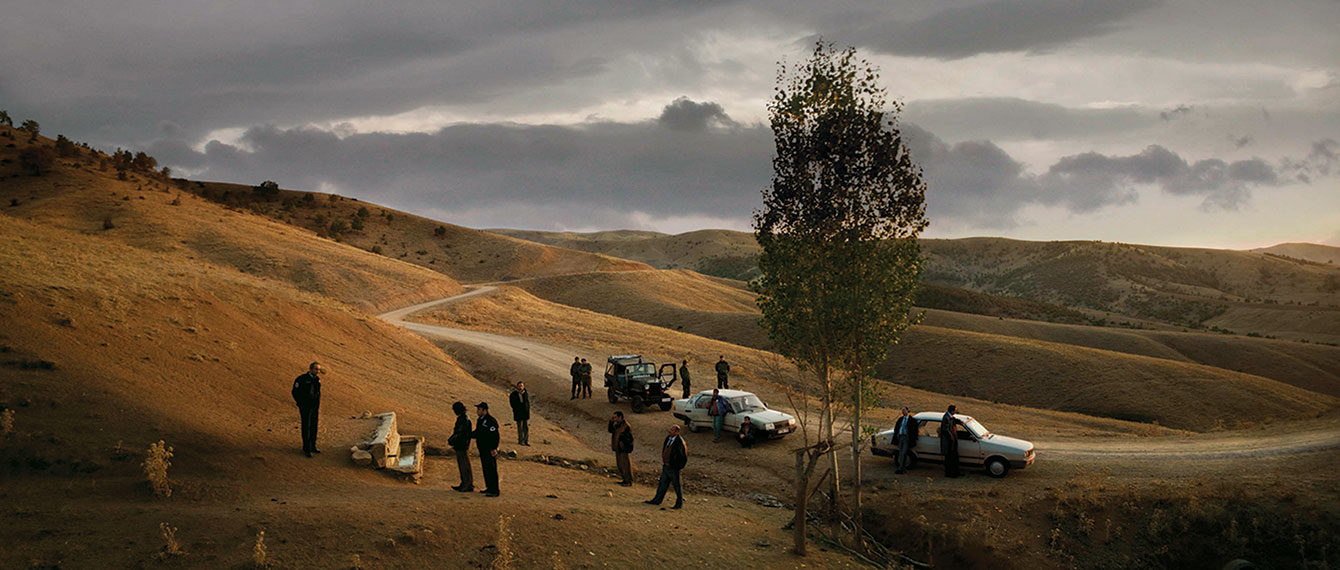
Still from Once Upon a Time in Anatolia
If Ceylan’s men are inept with one another, they are worse with women. Climates (2006) is the story of a breakup, one hundred minutes long. It starts in summer at the ancient ruins of Kaş, in southern Turkey. A professor of architecture, played by Ceylan himself, walks around the broken temple taking pictures, oblivious to his girlfriend. Eventually he turns to her: “Are you bored?” (This line, the first words spoken onscreen by a director often accused of longueurs, is a very Ceylan joke—more deadpan than this, you’d be dead.) The couple’s love, too, has crumbled; we are not told why. At the beach, the woman, Bahar, goes to sit by the shoreline while the man, Isa, looks out to sea from his spot further inland. By a trick of perspective, the camera, placed behind Isa, shows them side by side, her miniature form hovering near his shoulder like a bad conscience. In the distance is a boat, the tip of their wonky triangle, moving away. Ceylan excels at images like this: tableaux, in the realist style, of interior life. The pair separate. It is Isa we then follow, and Isa we trust least to tell us what went wrong. There are clues. He drops in on an old lover; a scene of brutal sex follows. It is difficult to watch, not because it is graphic but because we don’t know what we are watching. To the onlooker, the sex is hard to distinguish from rape. The horror of the scene is its illegibility. The film’s point—a perverse one for a visual medium—seems to be how little we see, how little we can trust what we are shown.
That winter, Isa tracks down Bahar in a snowy eastern province where she is working on a melodrama. He gives her an absurd gift: a plastic music box playing “Für Elise,” smuggled from Dubai. Later he finds her alone in a van and tells her he is changed, he wants another chance. His monologue is interrupted by the TV crew, who are loading the van with their gear—another joke at auteur cinema’s expense. That night, she comes to his hotel room. There is a hazy suite of shots, close-ups of hair and eyes, a hand dangling a cigarette. It is less a scene than a kind of trance. Whatever it is they are doing—parting, remembering, sleeping—we catch the feeling. Bahar’s name means spring, the film’s missing season: there will be no renewal, no resumption. People, it turns out, do not change much. This may be cinema in its pure state. Little happens; neither character is likable; the film—languid, ruminative, beautifully ambiguous—is hard to forget.
Bahar is played by Ebru Ceylan, a photographer who had just married the director. There is something amuletlike in casting yourself and your new bride as a miserable couple, just as there is in filming endless satires of yourself. Even that “Are you bored?” is a form of management. If I tell you I’m unbearable you can’t say I’m unbearable. Ceylan has said in interviews that cinema is like therapy, a place to put the darkness and say “Lights!”
In the early films he does it all himself, relying on his life for material, his own home for location, his family and friends for cast. After Distant, he can afford not to. For Climates he engages a cinematographer, Gökhan Tiryaki, who will shoot all his subsequent films, and a French sound designer, Olivier Dô Huu. New directions become possible. Almost more chilling than the sex/rape scene is the moment, a few minutes earlier, when the pair are sitting apart, and Ceylan’s character is eating hazelnuts. The volume is raised to such a pitch we hear them crack like bones between his teeth. We have learned enough about this cold, controlling man; the ferocity that follows is all but superfluous.
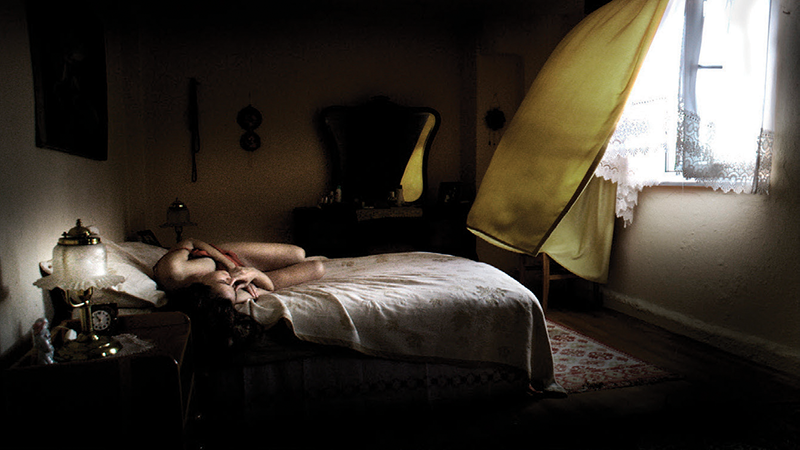
Still from Three Monkeys
Three Monkeys (2008) goes further. It is perhaps Ceylan’s most experimental film in terms of color and sound. It is also his darkest, and contains, by my reckoning, the oeuvre’s only unredeemable character. A politician, Servet, falls asleep at the wheel and kills someone on a dark road. Elections are approaching; he persuades his driver, Eyüp, to take the fall. The deal is irresistible: nine months of jail for a big payoff at the end. While he is inside, his wife, Hacer, is drawn into an affair with Servet. Of course, it ends badly—the cycle of violence renewed, the stain of corruption spreading. It would be pulp if it wasn’t so painterly. This is a sallow noir in greens and grays, with stabs of red throughout. The ringtone on Hacer’s phone, a lovesick pop song, punctuates the drama like a Greek chorus: “I hope your heart is made to melt . . . ”
Most of the film takes place in the family’s small top-floor apartment on a narrow block tapering to a point, like a grounded ship. Beside the building are train tracks and beyond it, the ocean—less a vista than a taunt. The whole thing might have been prompted by a line in Crime and Punishment: “Do you understand what it means when you have absolutely nowhere to turn?” The doomed family are often backlit, like shadow puppets—the playthings of larger forces. On a jail visit, the driver puts his suspicions to his son: “Is there someone else?” The line might also be translated as “Do we have anyone besides each other?” Their conversation, in close-up shots and countershots, appears to show them both behind bars. A breeze blowing through white curtains is one of the few moments of relief.
The critic Roger Ebert quipped in his review that the first five minutes of Three Monkeys, the scene of the hit-and-run, contains more action than all of Distant. Ceylan is realizing he can have it all: the satisfactions of genre and the rigors of art. He can give the people what they want and break new ground.
“You know what is new for us?” asks a character in the modernist writer Ahmet Hamdi Tanpınar’s 1949 novel Huzur.
Not Éluard’s poetry nor Stavrogin’s torment. What is new for us is a murder, a land dispute or divorce happening this evening in the tiniest Turkish village in the most far-off corner of Anatolia.
Ceylan has said of the small-town bureaucracy he witnessed as a child that “everyone was trying to humiliate each other.” The plainest faits divers, his films insist, are epics in waiting. Once Upon a Time in Anatolia (2011) is high art made of red tape, a metaphysical quest in the guise of a cop procedural. This is Ceylan at his most formally austere: the title promises a western, but it looks more like The Seventh Seal. For the first two hours we follow a convoy of cars scouring a hillside, at night, for a corpse. Don’t worry: boredom is the point. Only with this experience of real time can we be brought to the same pitch of despair as the search party. Police, prosecutor, doctor, diggers—and the suspect, who won’t say where he hid the body.
In this theater of the absurd, ordinary phenomena—a strong wind, a power cut—take on mythic force. We are both half-awake and hyperalert, our attention forced toward details that might otherwise pass us by. The empty moments a whodunit would skip over are Ceylan’s meat. Through the men’s conversations—on yogurt, prostates, suicide, marriage, the EU—ancillary dramas are played out until each is led to his own private epiphany. A rest stop at the mayor’s house offers one of Ceylan’s most profoundly moving scenes: the apparition of the mayor’s daughter, holding a candle—a vision of such cathartic grace after the night’s ordeal that it prompts the suspect to confess. But it is just a clearing, not a climax. No final revelation is at hand. The autopsy only raises further questions, turning the searchlight back on the young doctor—our erstwhile hero—who performed it.
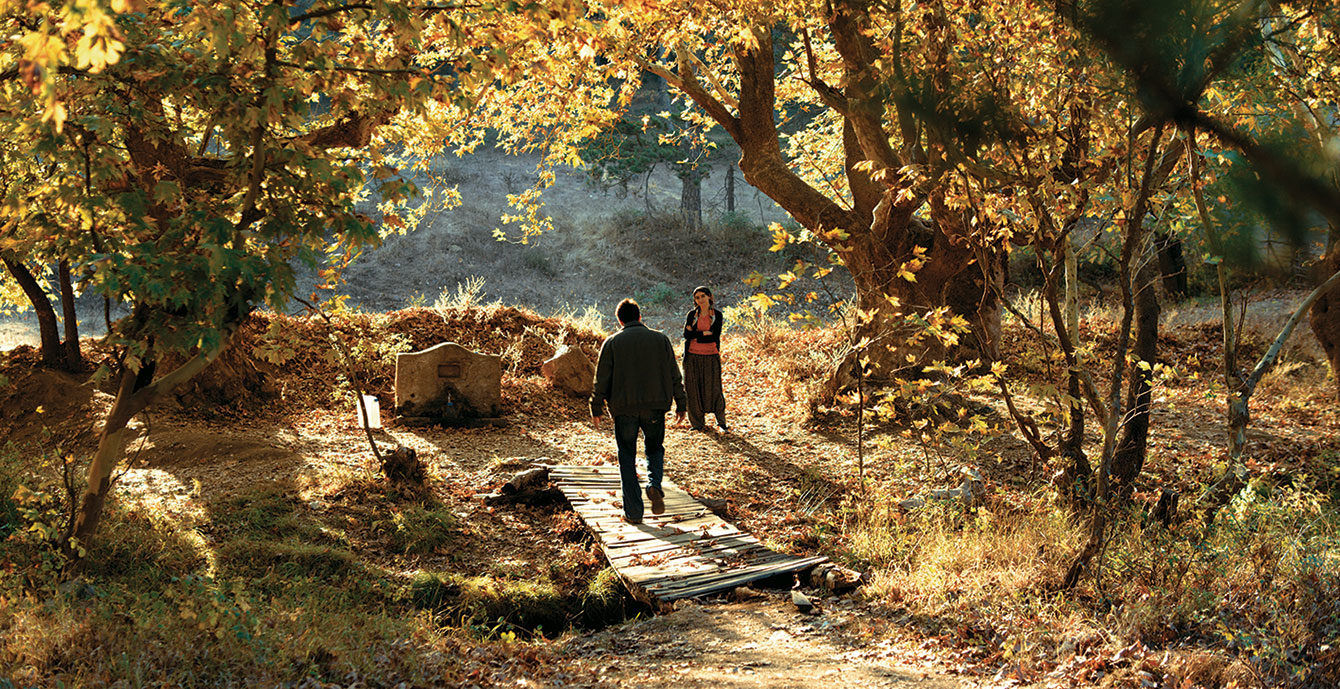
Still from The Wild Pear Tree
Are we as virtuous as we think we are? This is the subject of Winter Sleep (2014). Aydin, an aging former actor, runs a hotel he has inherited in the otherworldly region of Cappadocia. He lives with two women who despise him: his divorced sister Necla and his beautiful, cheerless wife, Nihal. Unlike in Climates, the relationship has not so much decayed as pickled, soured into stasis. Cappadocia is a postvolcanic landscape. This marriage, too, appears to be a wintry plain shaped by past eruptions. Once again, an intellectual sees his authority undermined. We are not given the key but told to look for it. Aydin likes to tell his guests what Omar Sharif once told him: acting is all about honesty. Harmless enough, you think. In fact it’s doubly self-serving—the smugness and the name-dropping—and triply offensive for seeming benign. Aydin is like this: not a monster, but insufferable at length to those who know him. (Ceylan’s names are often meaningful, usually ironic. Aydin means enlightened. Isa, the cruel lead in Climates, means Jesus.)
The hotel came with its surrounding cottages. Aydin is a landlord, but delegates the dirty work of evicting tenants to his aide, leaving him free to write patronizing columns in the local paper and to read out admiring letters from his fans. His study is lined with masks and mirrors, but the pompous face he presents to the world deceives only himself. We are two hours in when Nihal finally gives it to him straight: “You are an unbearable man . . . Conscience. Morals. Principles. These are the words you use to humiliate others.” It was while watching this scene that I realized how much Turkish sounds like Swedish; Bergman’s spirit flickers in the tense firelight. Here too, judgment refuses to settle. The script’s skill is to turn over every argument like an opal until it glows, more complex than the sum of its colors. (You sense the work of many hands; Ebru Ceylan has co-written all the films since Climates, sometimes with others.) Dialogue doesn’t tell us much, Ceylan has said, because “in real life we always lie.” Anyway, people don’t listen. One of the film’s first exchanges goes like this: “Would you like some coffee?” “I gathered some mushrooms.” But it doesn’t sound like Beckett. It sounds like you and me.
The later films approach the texture of life: opaque, spasmodic, slow then fast then slow. The last two hit the three-hour mark. Controlled, sinewy structures have relaxed into a novelistic bagginess. The Wild Pear Tree (2018), Ceylan’s latest, is rambling in all the good ways: full of walking, talking, the expansive tendriled growth of certain plants. It is the story of Sinan, fresh out of college, who returns to his sleepy hometown in western Turkey, near the ruins of Troy. Where else is there to turn? Choices are slim: blow his youth on a teaching post in the provinces, or sign up for the riot police like his fellow literature graduates? He has produced a manuscript, a collection of musings on local life he describes as a “quirky metafiction.” He simply needs to raise the funds to publish it. But help is not forthcoming: his father, a lovable wastrel, has gambled away his teacher’s salary and escapes every weekend to dig a well on a hill everyone knows is dry. And neither the mayor nor a local sand tycoon, in two marvelously bathetic set pieces, will fund a project with so little commercial value. Why doesn’t he just write about Troy? Why not give the people what they want?
Many of Ceylan’s men are toughened, even numbed, by life’s blows. The films tend to describe a loss of innocence. Sinan’s journey is different: defeat will open and soften him, bring him closer to the gentle, deadbeat father he resembles than his argumentative, cocksure younger self would like. His coming of age plays out in long philosophical discussions, each like a one-act play, including a twenty-minute meander on the meaning of life with two imams. It’s more than a talkie; it’s more like Dostoevsky. Digressions on faith, morality, free will, nostalgia, and religious reform would creak if they weren’t so light-footed. The Wild Pear Tree has a gnarled, complicated appeal: long, twisted branches bearing bittersweet fruit, which require time and effort to digest.
Not that Ceylan has lost his flair for sheer visual delight. Near the beginning, Sinan runs into his old flame, Hatice. The countryside around them is ablaze with autumn light. In a bath of gold between two trees, they talk, tease, madden each other, kiss. We know all this by suggestion. Gone are the quick-fire shots and countershots. The camera hovers in the leaves, in Hatice’s hair. We see their mouths meet from the treetop, through the rustling canopy. Then she bites him—a rare moment, in this masculine world, where a woman does something that suggests an inner life. The wound will stain his lip for most of the film. Embedded in the large, loose narrative are the techniques of poetry: a slant approach, cutting deep.







































































































